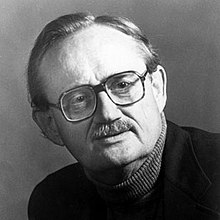Alan P. Merriam
| Alan P. Merriam | |
|---|---|

Alan Merriam
|
|
| Born |
November 1, 1923 Missoula, Montana |
| Died | March 14, 1980 (aged 56) Warsaw, Poland |
| Fields | Ethnomusicology, Anthropology |
| Institutions | Indiana University |
| Alma mater | Northwestern University (Ph.D., 1951) |
| Thesis | (1951) |
| Doctoral advisor | Melville J. Herskovits, Richard A. Waterman |
| Known for | Study of music in Central Africa, Native America, music and anthropology. |
Alan Parkhurst Merriam (1 November 1923 – 14 March 1980) was an American cultural anthropologist and ethnomusicologist. He is known for his studies of music in Native America and Africa. In his book The Anthropology of Music (1964), he outlined and develops a theory and method for studying music from an anthropological perspective with anthropological methods. Although he taught at Northwestern University and University of Wisconsin, the majority of his academic career was spent at Indiana University where he was named a professor in 1962 and then chairman of the anthropology department from 1966 to 1969, which became a leading center of research ethnomusicology under his guidance. He was a co-founder of the Society for Ethnomusicology in 1952 and held the elected post of president of that society from 1963 to 1965. He edited the Newsletter of the Society for Ethnomusicology from 1952 to 1957, and he edited the journal Ethnomusicology from 1957 to 1958.
Merriam's initial work was based on fieldwork carried out in his native Montana and central Africa. He undertook extensive field research among the Flathead Indians of Montana in 1950 (for his PhD) and again in 1958. In Africa, he studied with the Basongye and Bashi people of Zaïre (now the Democratic Republic of Congo) and Burundi in the 1950s and again in 1973. Later, Merriam proposed a tripartite model for the study of ethnomusicology, centering on the study of "music in culture." This model suggested that music should be studied on three analytic levels: conceptualization about music; behavior in relation to music; and analysis of music's sounds. In later works, Merriam amended his original concept of "music in culture" to "music as culture."
...
Wikipedia
